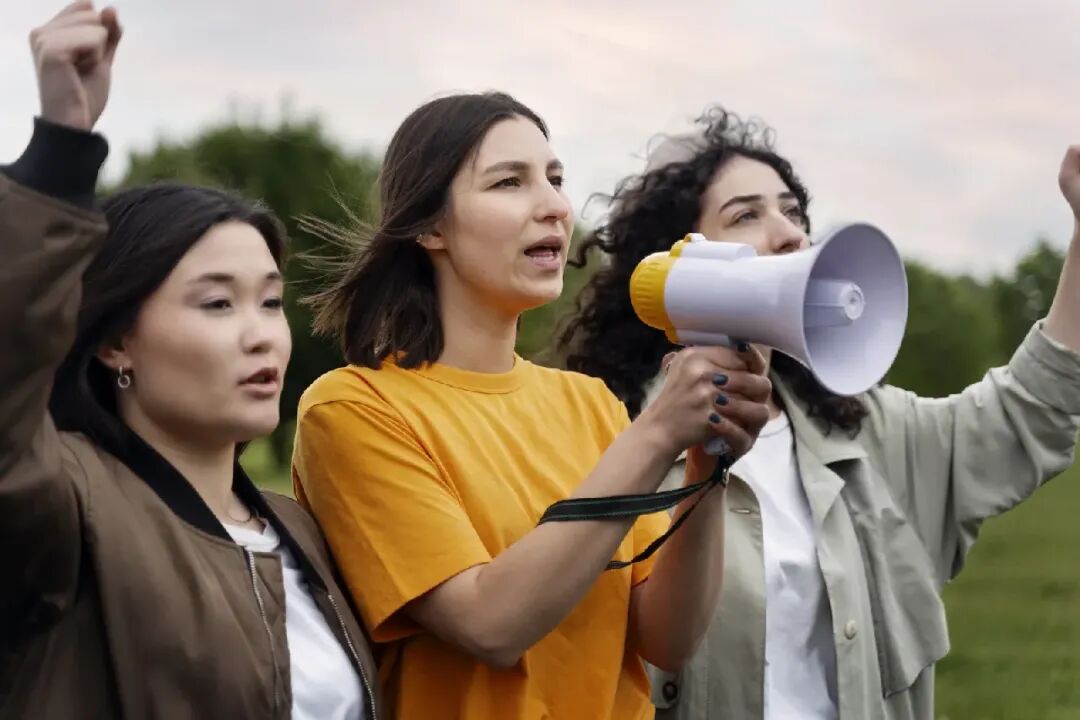Progress on gender equality is stalling as protest activities worldwide remain restricted.
Image source:Freepik.com
Kathleen Sherwin
Chief Strategy and Business Officer at Plan International
Rose Caldwell
CEO of Plan International UK
A report by Plan International reveals that girls are not yet reaping the gender equality progress they were promised.
Girls are leading movements globally and regionally, but they need support from governments, the private sector, and civil society organizations.
This articleThe report outlines its key insights, compares them with the global context, and explores unique approaches to bridging the gap.
We have witnessed the shrinking and transformation of public spaces. Progress on gender equality has stalled, and the right to protest is severely restricted in many countries around the world. Young women’s ability to voice their perspectives—and their right to continue driving change and holding leaders accountable—must be safeguarded and supported.Since 2007, Plan International has been conducting surveys of thousands of girls to gain a deeper understanding of the opportunities and challenges they face. These studies cover a wide range of topics—ranging from their experiences in conflict and crisis settings, to how they navigate the digital world, to their approaches to formal and informal education—and even include personal stories of harassment and violence they’ve endured. The research draws on insights shared by diverse adolescent girls and young activists from around the globe, with the ultimate goal of collaborating with girls themselves to fuel the global movement for girls’ rights and advance the agenda for gender equality. While some progress has been made, the harsh reality remains that, in many areas, advancements in girls’ rights and gender equality have stalled—or even regressed altogether.What challenges does the young women's rights movement face?We’ve seen that young women around the world are ready and eager to speak up for themselves—whether it’s leading climate action or advocating for sexual health and personal rights. They’re standing firm in defending their rights and working to make their communities better. Nearly all (95%) of the girl and young female activists we surveyed say their activism has had a positive impact on their lives, helping them feel proud, empowered, and capable. More than half of those we interviewed even noted that the influence of their activism has already met—or even surpassed—their expectations. But it’s not easy: being a young female activist can be challenging, requiring resilience and unwavering determination.More than half of the young women surveyed believe that funding shortages are the primary barrier preventing them from participating in activities. One in five young female activists expressed concerns about their safety when carrying out their work. Meanwhile, a quarter of the girls said that negative attitudes from family members or their communities are the main obstacle to their involvement in activism.The activities have caused significant harm to the girls' mental health and may lead to substantial personal losses. Many of the girls we interviewed have experienced anxiety, depression, burnout, and emotional exhaustion. One in four reported feeling emotionally uncomfortable or anxious while working on these activities—among LGBTIQ+ activists, this figure rises to one in three."Girls don’t get the chance to express their thoughts—often, their perspectives aren’t valued as much as boys’," says 16-year-old Julia from Jordan. "If a boy and a girl are sitting in the same room, it’s usually the boy who gets priority to share his opinion."Today, girls are deeply concerned about the state of the world—they still feel unsafe, face school dropout rates, endure sexual and gender-based violence, lack access to adequate healthcare, are excluded from equal participation in digital spaces, struggle to secure meaningful employment, and bear the brunt of climate injustice. When decisions are made about the well-being of young women, their voices must be heard and included. After all, if girls are left out of meaningful engagement in shaping a world where they can thrive, the global community will never achieve the Sustainable Development Goals—or any future global objectives.The research is also being conducted at both global and local levels—recently, for instance, the report "State of Girls' Rights in the UK" surveyed nearly 3,000 young women to explore their experiences and lives within their communities. While some issues vary depending on the context, most findings align with the global challenges girls worldwide are facing. The girls strongly emphasized that they haven’t witnessed the promised progress toward gender equality—they increasingly feel their rights are being eroded. They describe feeling trapped by constraints in their daily lives and choices, growing anxious about their futures amid rising costs of living, the climate crisis, and the emergence of a "male-dominated sphere."Only 1 in 20 girls in the UK say they feel completely safe in public spaces. Just over half (54%) of girls believe they have equal educational and employment opportunities compared to their male peers or boys. And only 1 in 4 girls feel they have a voice in national governance decisions.A 25-year-old British girlBridie said:“I have a twin brother, and although we were raised the same way, the treatment we received as a woman and a man was quite different. From an early age, I believed I could achieve anything—but in reality, I’ve faced a few challenges along the way.”What changes do young women want to see?1. Provide funding:Governments, donors, international NGOs, and other local and national funding agencies need to provide flexible and diverse financial support to grassroots organizations led by young women.2. Addressing gender discrimination:Community and government leaders must address gender stereotypes at all levels of society—including within families—so that young women’s initiative and contributions to society are recognized and valued. They must also broaden opportunities for young women to engage meaningfully in every sphere of public life, including participation in policy-making discussions.3. Protecting Public Spaces:National and international policymakers must safeguard public spaces across all sectors to uphold citizens' freedoms, including the right to safely protest. Whether in online or offline settings, harassment and abuse against young women must be condemned and punished without exception.4. Investment Training:Schools, colleges, and civil society organizations must support skills training and knowledge-building—including soft skills such as leadership, self-confidence, public speaking, and communication—to enhance young women’s effectiveness and engagement in driving the changes they aspire to see.5. Ensuring Safety:Authorities working with young women—including representatives from schools, non-governmental organizations, police forces, government departments, and the United Nations—must recognize and address the unique risks they face when participating in activities, including threats to their mental health and physical safety.
The above content solely represents the author's personal views.This article is translated from the World Economic Forum's Agenda blog; the Chinese version is for reference purposes only.Feel free to share this on WeChat Moments; please leave a comment below if you’d like to republish.
Editor: Wang Can
The World Economic Forum is an independent and neutral platform dedicated to bringing together diverse perspectives to discuss critical global, regional, and industry-specific issues.
Follow us on Weibo, WeChat Video Accounts, Douyin, and Xiaohongshu!
"World Economic Forum"





